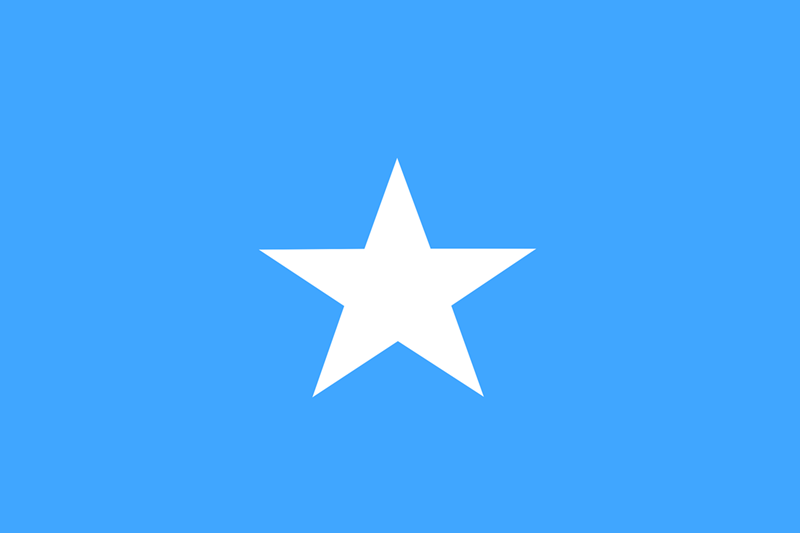MUQDISHO – In a vibrant show of patriotism and historical reflection, Somalia marked the 65th anniversary of the independence of its northern regions from British colonial rule with nationwide celebrations and calls for unity, reconciliation, and progress. The annual commemoration, held on June 26, stands as a symbol of the country’s enduring quest for sovereignty and cohesion, even amid ongoing political complexities and calls for secession from Somaliland.
From Muqdisho to Kismaayo, from Garoowe to Baidoa, streets were illuminated in blue, and national flags were raised at midnight to mark June 26, 1960, the date on which British Somaliland gained independence, just five days before uniting with Italian Somaliland to form the Somali Republic on July 1, 1960.
The main state-led commemoration took place at the Banadir Regional Headquarters, attended by a cross-section of Somali society including President Hassan Sheikh Mohamud, Cabinet Ministers, members of both Houses of Parliament, military leaders, and representatives of civil society organizations. The event included speeches, traditional music, a flag-raising ceremony, and a moment of silence for Somali martyrs.
In his keynote address, President Mohamud emphasized that while Somalia has faced decades of civil war, political instability, and extremist insurgency, the ideals that inspired the independence movement remain alive.
“This is not just a celebration—it is a moment of reflection,” the President said. “The dream of a united, just, and peaceful Somalia is still within our reach if we recognize our shared destiny, acknowledge past wounds, and commit to a future built on reconciliation and good governance.”
While the federal government led the main celebrations in Mogadishu, similar ceremonies took place in all Federal Member States, notably in Jubaland, Galmudug, Hirshabelle, and South West State. Each region organized parades, school competitions, flag-hoisting ceremonies, and youth forums to educate the next generation about Somalia’s historic journey to statehood.
However, the breakaway region of Somaliland, which unilaterally declared independence in 1991, observed the day differently. In Hargeisa, President Muse Bihi Abdi’s successor, President Abdirahman Mohamed Abdillahi “Cirro”, addressed the public, reiterating Somaliland’s call for international recognition. He stated that June 26 was a day of “reflection on the brief sovereignty of British Somaliland” and reasserted that Somaliland’s case for self-rule remains valid and lawful.
To understand the significance of June 26, it’s essential to revisit the historical 1960 unification.
- The people of British Somaliland and Italian Somaliland.
- The former gained independence from Britain (June 26), and the latter from Italy (July 1), leading to the union of both territories into the Somali Republic.
- June 26, 1960 (British Somaliland); July 1, 1960 (Italian Somaliland).
- The present-day territory of Somalia.
- Driven by pan-Somali nationalism and a shared cultural and ethnic identity.
Through negotiated withdrawal of colonial powers, peaceful transitions, and the signing of a unification act.
The brief five-day period during which the north was technically an independent state is particularly important to Somaliland’s case for re-establishing its former sovereignty. For Somalia’s federal government and unionist voices, however, the unification of July 1 represents the founding of a united Somali nation—making June 26 a key stepping stone in that national narrative.
This year’s celebrations occur at a pivotal time for Somalia’s political trajectory. With a constitutional review process underway, ongoing security operations against Al-Shabaab, and planned universal suffrage elections in 2026, the country is striving to reassert state authority and democratic order. But beneath the fanfare lies the unresolved Somaliland question, which continues to test the boundaries of Somali federalism and national cohesion.
During the commemoration, opposition figures and civil society leaders urged both Mogadishu and Hargeisa to reopen dialogue, emphasizing that the historic struggle for independence must be honored with unity, not division.
At youth forums organized in conjunction with the festivities, students and young professionals expressed a renewed sense of national identity and responsibility. Many called for education reforms that emphasize history, civic responsibility, and digital literacy, linking Somalia’s past struggles with future innovation, especially in security, governance, and technology.
“We can’t fully move forward if we don’t understand where we came from,” said Fadumo Ahmed, a law student in Mogadishu. “The generation that fought for independence gave us a dream. It’s up to us to finish it.”
As Somalia marks 65 years since its first step toward full independence, the day serves both as a source of national pride and a reminder of the unfinished journey toward reconciliation and unity. While the historic events of June 26, 1960 laid the foundation for Somali nationhood, the path ahead remains complex.
The need to bridge federal-state tensions, engage Somaliland in peaceful dialogue, and empower future generations is more pressing than ever. In the spirit of the independence fighters who risked everything for sovereignty, today’s leaders face a different kind of battle—one for dignity, inclusion, and national healing.
